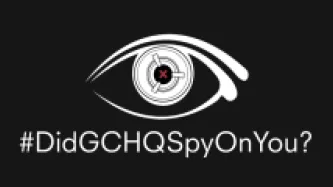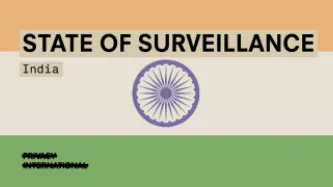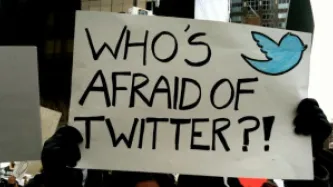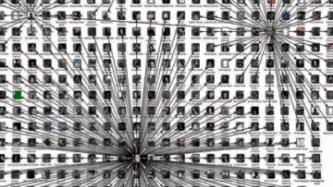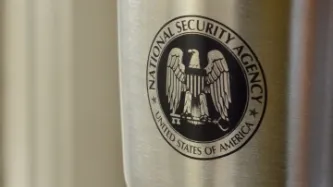Search
Content type: News & Analysis
As Amnesty International and Forbidden Stories continue to publish crucial information about the potential targets of NSO Group’s spyware, we know this much already: something needs to be done.
But what exactly needs to be done is less obvious. Even though this is not the first time that the world has learned about major abuses by the surveillance industry (indeed, it’s not even the first time this month), it’s difficult to know what needs to change.
So how can the proliferation and use of…
Content type: Examples
When Dallas police posted on Twitter asking for videos of the protests taking place after George Floyd's killing, a flood of videos and images of K-pop stars were uploaded to its anonymous iWatch Dallas tip-off app. Law enforcement can call on vast numbers of networked cameras - from cars, food and retail chains that are typically willing to share with police, law enforcement agencies' own networks of surveillance and body cameras as well as object and face recognition software, protesters and…
Content type: Long Read
The Grand Chamber of the European Court of Human Rights ruled that the UK government’s historical mass interception program violates the rights to privacy and freedom of expression. The Court held that the program “did not contain sufficient “end-to-end” safeguards to provide adequate and effective guarantees against arbitrariness and the risk of abuse.” As a result the Court ruled that UK law "did not meet the “quality of law” requirement and was therefore incapable of keeping the “…
Content type: Long Read
On 25 May 2021, the European Court of Human Rights issued its judgment in Big Brother Watch & Others v. the UK. Below, we answer some of the main questions relating to the case.
After our initial reaction, below we answer some of the main questions relating to the case.
NOTE: This post reflects our initial reaction to the judgment and may be updated.
What’s the ruling all about?
In a nutshell, one of the world’s most important courts, the Grand Chamber of the European Court of Human…
Content type: Long Read
What’s the ruling all about?The Constitutional Court of South Africa in a historic judgment declared that bulk interception by the South African National Communications Centre is unlawful and invalid. Furthermore, the Constitutional Court found that the Regulation of Interception of Communications and Provision of Communication-Related Information Act (RICA) 1) was deficient in failing to provide at least a post-notification procedure for subjects of interception; 2) failed to ensure the…
Content type: Long Read
Everyday objects and devices that can connect to the Internet -- known as the Internet of Things (IoT) or connected devices -- play an increasing role in crime scenes and are a target for law enforcement. Exploiting new technologies that are in our homes and on our bodies as part of criminal investigations and for use as evidence, raises new challenges and risks that have not been sufficiently explored.
We believe that a discussion on the exploitation of IoT by law enforcement would…
Content type: Impact Case Study
What HappenedOn 5 June 2013, The Guardian published the first in a series of documents disclosed by Edward Snowden, a whistleblower who had worked with the NSA. The documents revealed wide-ranging mass surveillance programs conducted by the USA’s National Security Agency (NSA) and the UK’s Government Communications Headquarters (GCHQ), which capture the communications and data of hundreds of millions of people around the world. In addition to revealing the mass surveillance programs of the NSA…
Content type: Long Read
Yesterday, the European Court of Human Rights issued its judgement in Big Brother Watch & Others V. the UK. Below, we answer some of the main questions relating to the case.
What's the ruling all about?
In a nutshell, one of the world's most important courts, the European Court of Human Rights, yesterday found that certain UK laws about how intelligence agencies can spy on our internet communications breach our human rights. These surveillance laws have meant that the UK intelligence…
Content type: News & Analysis
Simply put, the National Security Agency is an intelligence agency. Its purpose is to monitor the world's communications, which it traditionally collected by using spy satellites, taps on cables, and placing listening stations around the world.
In 2008, by making changes to U.S. law, the U.S. Congress enabled the NSA to make U.S. industry complicit in its mission. No longer would the NSA have to rely only on international gathering points. It can now go to domestic companies who hold massive…
Content type: Long Read
This piece was written by Ashley Gorski, who is an attorney at the American Civil Liberties Union, and PI legal officer Scarlet Kim and originally appeared in The Guardian here.
In recent weeks, the Hollywood film about Edward Snowden and the movement to pardon the NSA whistleblower have renewed worldwide attention on the scope and substance of government surveillance programs. In the United States, however, the debate has often been a narrow one, focused on the…
Content type: Long Read
This week, Privacy International, together with nine other international human rights NGOs, filed submissions with the European Court of Human Rights. Our case challenges the UK government’s bulk interception of internet traffic transiting fiber optic cables landing in the UK and its access to information similarly intercepted in bulk by the US government, which were revealed by the Snowden disclosures. To accompany our filing, we have produced two infographics to illustrate the…
Content type: Press release
Key points
Privacy International, Liberty, Amnesty International, and seven other human rights organizations challenge UK mass surveillance and UK access to US mass surveillance at the European Court of Human Rights
This is the first case before the European Court of Human Rights to directly challenge UK and US mass surveillance revealed by the Snowden disclosures
National courts and oversight bodies have failed to rein in mass surveillance practices that impact hundreds of millions of…
Content type: News & Analysis
Thank you to those of you who joined our campaign, 'Did GCHQ Illegally Spy on You?'. If you made a claim to the Investigatory Powers Tribunal (IPT) - the court that hears claims about surveillance by public bodies, including the intelligence agencies - to find out if GCHQ has illegally obtained your communications, you will have probably received a letter or email from the IPT by now. We've written a 'Frequently Asked Questions' (FAQ) to help clarify what the ruling means and how you can now…
Content type: News & Analysis
Section 217 and the Draft Code of Practice on Interception of Communications
Tech giants including Apple Inc, Facebook Inc, Google Inc, Microsoft Corp, Twitter Inc and Yahoo Inc have been openly critical of the UK Government’s Investigatory Power Bill (IPBill). However, what has not been highlighted is a deeply concerning Draft Code of Practice on Interception on Communications, which will not only affect telecommunications companies small and large, but result in costs to the…
Content type: News & Analysis
We already know that in some countries, like the UK, governments are drafting laws to legalise and legitimise their incredible surveillance powers. In the U.S. we are seeing legislation that is using remarkably similar language on encryption and surveillance. The next phase of the cryptowars has openly begun.
Yesterday what is being called the Feinstein-Burr decryption Bill was introduced into the US Senate and leaked online. Whilst the short title ‘Compliance with Court Orders…
Content type: Long Read
Written by: Centre for Internet and Society
This guest piece was written by representatives of the Centre for Internet and Society (CIS). It does not necessarily reflect the views or position of Privacy International.
Introduction
As part of the State of the Surveillance project, CIS conducted a review of surveillance law, policy, projects, and trends in India. Below we provide a snap shot of key legal provisions governing surveillance in India and touch on…
Content type: Press release
Today’s report by the Joint Committee on the Investigatory Powers Bill is the third committee report that concludes that the Home Office has failed to provide a coherent surveillance framework.
The Joint Committee on the Investigatory Powers Bill today published a 198 page report following a short consultation period between November and January. Their key findings are that:
- the definitions in the bill need much work, including a meaningful and comprehensible…
Content type: News & Analysis
Internet Connection Records are a new form of communications data created by the Investigatory Powers Bill at Parts 3 and 4. They constitute an unlawful interference with privacy with the ability to provide a highly detailed record of the activities of individuals, profiling their internet habits.
Clause 62 of the Investigatory Powers Bill (“IP Bill”) permits a wide range of public authorities to collect Internet Connection Records, however throughout debates on this highly controversial new…
Content type: Press release
Governments must accept they have lost the debate over the legitimacy of mass surveillance and reform their oversight of intelligence gathering, Privacy International and Amnesty International said today in a briefing published two years after Edward Snowden blew the lid on US and UK intelligence agencies’ international spying network.
“The balance of power is beginning to shift,” said Edward Snowden in an article published today in newspapers around the world. “With each court victory,…
Content type: Press release
Privacy International and several other human rights organisations are taking the UK Government to the European Court of Human Rights over its mass surveillance practices, after a judgement last year found that collecting all internet traffic flowing in and out of the UK and bulk intelligence sharing with the United States was legal.
The appeal, filed last week by Privacy International, Bytes for All, Amnesty International, Liberty, and other partners, comes in response to a…
Content type: Press release
British intelligence services acted unlawfully in accessing millions of people’s personal communications collected by the NSA, the Investigatory Powers Tribunal ruled today. The decision marks the first time that the Tribunal, the only UK court empowered to oversee GHCQ, MI5 and MI6, has ever ruled against the intelligence and security services in its 15 year history.
The Tribunal declared that intelligence sharing between the United States and the…
Content type: News & Analysis
A year after the Eyes Wide Open program was launched here at Privacy International, we are just beginning to scratch the surface of the processes and justifications that agencies like GCHQ use to make their spying legally compliant. Tocqueville, a great philosopher of law stated:
“If they prize freedom much, they generally value legality still more. They are less afraid of tyranny than of arbitrary power, and provided the legislature undertakes of itself to deprive men of their independence,…
Content type: Press release
The Investigatory Powers Tribunal (IPT) today followed its previous judgments in finding that UK security services may in principle carry out mass surveillance of all fibre optic cables entering or leaving the UK under RIPA, the 2000 law that pre-dates the modern internet.
In summary, the Tribunal in today's decision said the system of mass surveillance disclosed by Edward Snowden could in principle be lawful. But the Tribunal has asked for more submissions about whether…
Content type: Press release
Britain’s top counter-terrorism official has been forced to reveal a secret Government policy justifying the mass surveillance of every Facebook, Twitter, Youtube and Google user in the UK.
This disturbing policy was made public due to a legal challenge brought by Privacy International, Liberty, Amnesty International, the American Civil Liberties Union, Pakistani organisation Bytes for All, and five other national civil liberties organisations[fn]Canadian Civil Liberties…
Content type: News & Analysis
Earlier this month, only a few days before the new president of Egypt was sworn in, leaked documents from the Ministry of Interior revealed that the government is trying to acquire mass surveillance equipment capable of monitoring social networks such as Facebook, Twitter, and YouTube.
While being billed as a way to monitor social media in order to “monitor security hazards in social networks” and “identify persons representing a danger on society” (sic), past and recent actions by…
Content type: News & Analysis
NETMundial – a global conference initiated by the Brazilian government – has produced ‘The Multi-stakeholder Statement of São Paulo’, a Roadmap and Principles on internet governance that could herald new respect for the right to privacy online. However, the outcome document fails to adequately recognise the relationship between internet governance and mass surveillance, reflecting a larger problem that was present throughout the two-day meeting.
By the end of the conference, both the…
Content type: News & Analysis
The latest Snowden document revelation, which shows how GCHQ and the NSA are conducting broad, real-time monitoring of YouTube, Facebook, and Blogger using a program called "Squeaky Dolphin," is the most recent demonstration of the immense interception capabilities of intelligence services.
Despite the program's cute name, "Squeaky Dolphin" is shocking in its ability to intercept raw data, which includes sensitive personal and location information, and keep tabs on people across the world who…
Content type: News & Analysis
It was a throwaway line in a Washington Post article, one of the many stories about government surveillance in the past few months.
By September 2004, a new NSA technique enabled the agency to find cellphones even when they were turned off. [Joint Special Operations Command] troops called this “The Find,” and it gave them thousands of new targets, including members of a burgeoning al-Qaeda-sponsored insurgency in Iraq, according to members of the unit."
Being able to track a mobile phone,…
Content type: Long Read
Privacy International filed formal complaints with the Organisation for Economic Cooperation and Development (OECD) in the UK against some of the world’s leading telecommunication companies, for providing assistance to British spy agency GCHQ in the mass interception of internet and telephone traffic passing through undersea fibre optic cables.
According to recent reports, BT, Verizon Enterprise, Vodafone Cable, Viatel, Level 3, and Interoute granted access to their fibre optic…
Content type: News & Analysis
UPDATE: The Guardian has just reported that "The UK's electronic eavesdropping and security agency, GCHQ, has been secretly gathering intelligence from the world's biggest internet companies through a covertly run operation set up by America's top spy agency."
This recent news reveals a long-held suspicion that the GCHQ had the very powers they were seeking to place on a statutory footing with the Snooper Charter, a bill that was knocked back for being unnecessary and…










